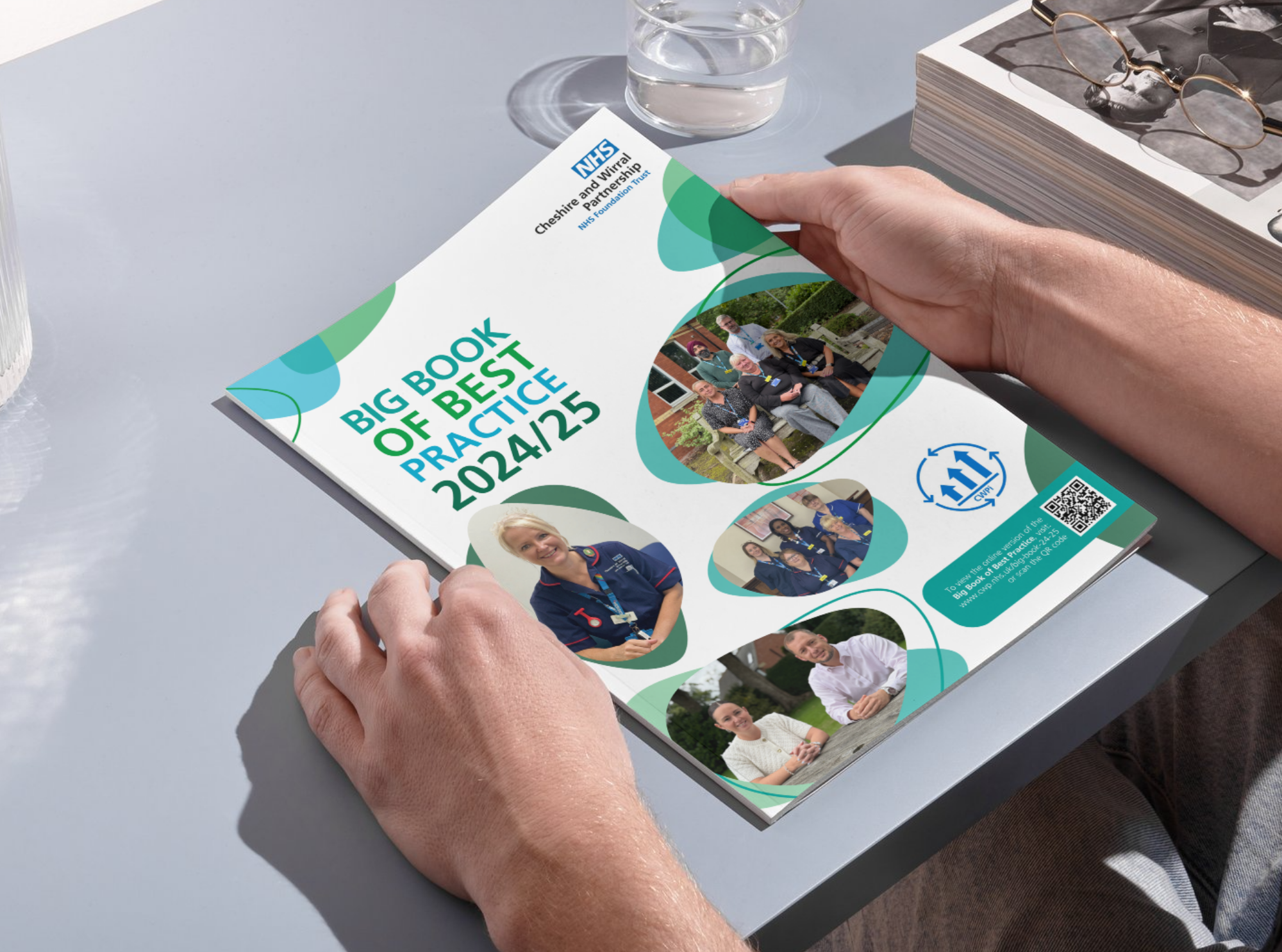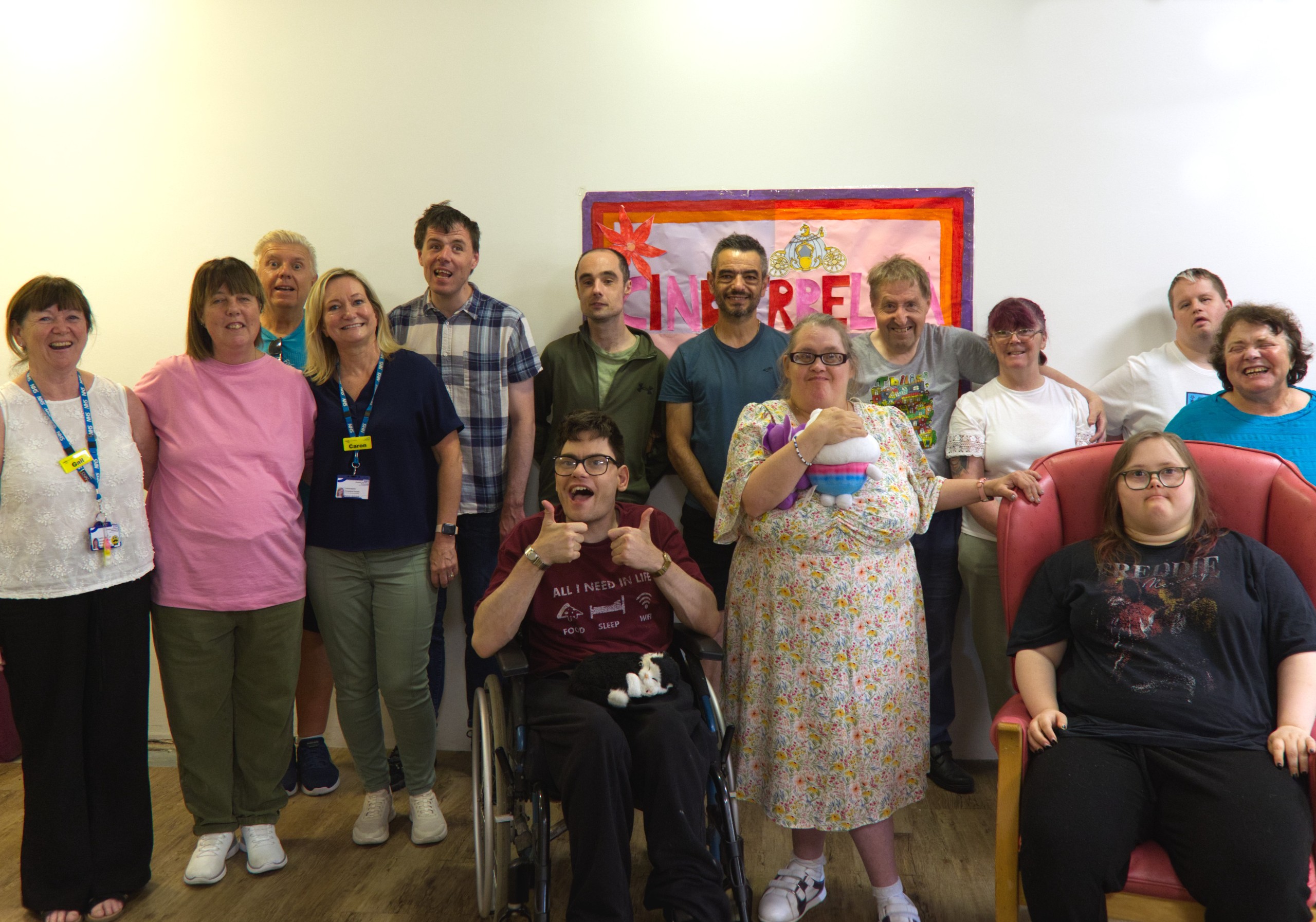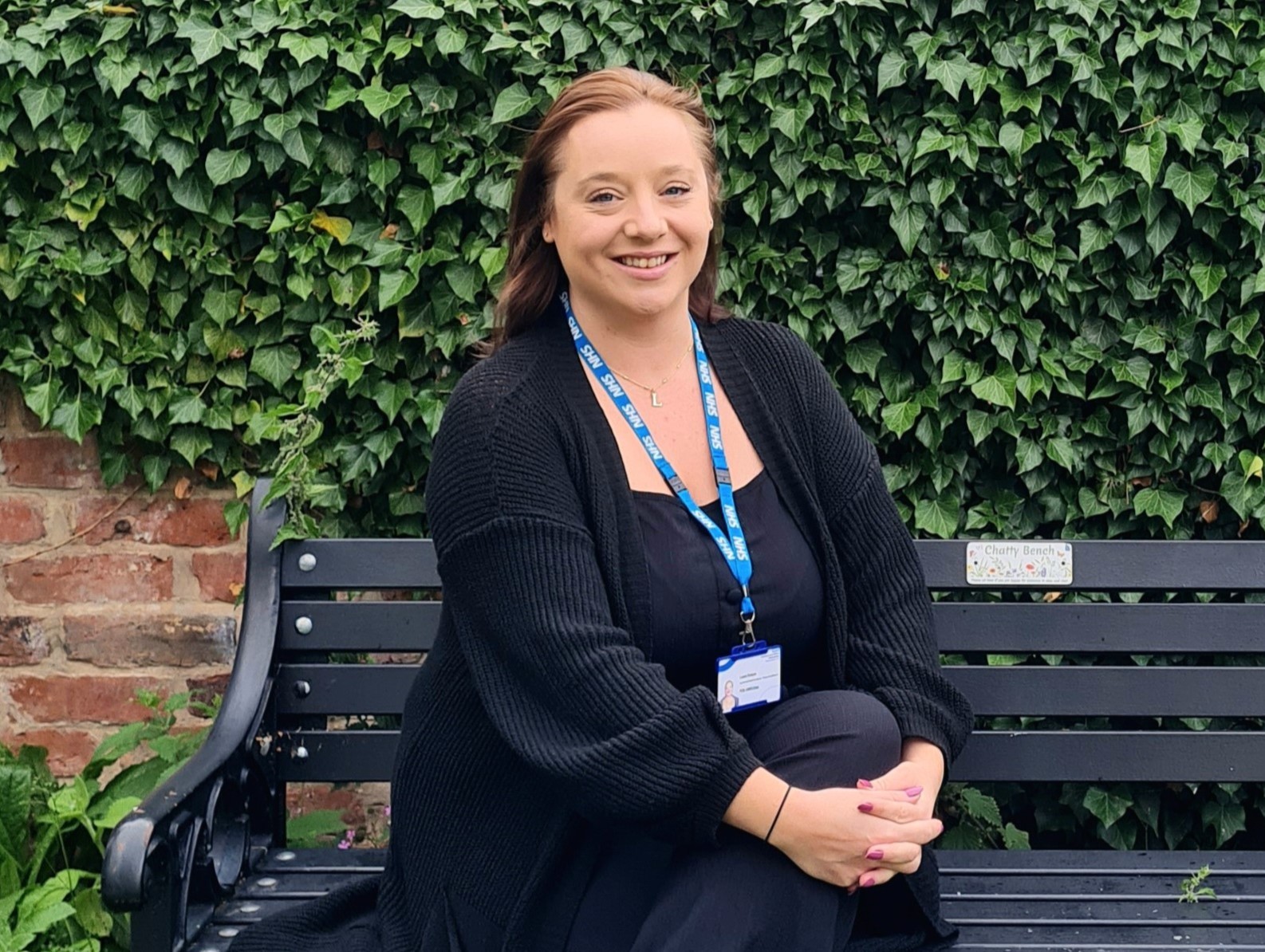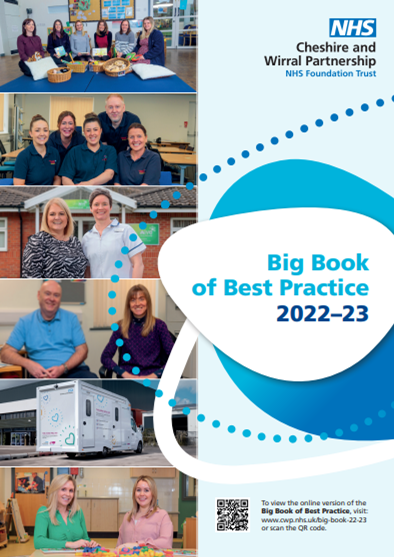Below you can view all the entries that made it into the Big Book of Best Practice 2024-25 from the children, young people and families care group.
Contact details for each project can be found within the entries below. For more information about the Big Book of Best Practice, email cwp.
Team: Cheshire 0-18 Children and Young People’s Mental Health Service
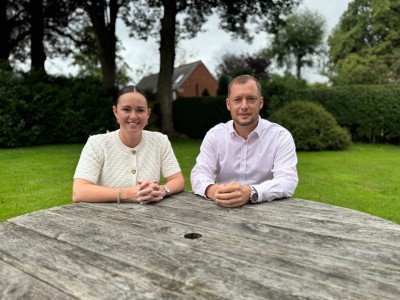
What we wanted to achieve
There has been a number of requests for consultation with consultant psychological professionals from the 0-18 workforce. This required an accessible and streamlined model to accommodate this within a very limited resource. The Cheshire 0-18 CYPMHS team piloted an enhanced formulation lab (EFL) to:
- provide a forum for clinicians to bring more complex cases at an early stage
- support continuous learning and development
- increase collaboration and resilience
- embed a trauma-informed approach to care
- further embed a ‘think family’ approach
- increase oversight of the workforce’s strengths and areas requiring support
What we did
The service piloted an EFL open to all Cheshire 0-18 CYPMHS staff, which ran weekly via Microsoft Teams. Each meeting offered capacity for the discussion of two cases, with the use of a ‘10-10-10’ format for the 30-minute slot:
- First 10 minutes: describe
- Second 10 minutes: questions to clarify
- Third 10 minutes: move to formulation.
The facilitators aimed to foster a collaborative approach to support the central task of formulation and making sense of the clinical material, as well as shared learning and non-judgmental enquiry.
Results
An interim evaluation after six sessions found:
- four out of six sessions were utilised
- attendance ranged from five to 14 professionals per meeting, with all three Cheshire teams represented at each session
- colleagues from another service also attended
- the professional mix included the full range of professionals from the multidisciplinary team
A survey of attendees suggests that the EFL was well received and valued:
- 100% of respondents found it helpful to hear about/share ideas and experiences with practitioners from other teams. Practitioners reported they felt more supported.
- Facilitators concluded this is a needed space that is being used appropriately to develop psychological formulation skills and sharing of expertise.
- It is an efficient use of scarce resource
Next steps
- The pilot is being evaluated in line with a plan, do, study, act (PDSA) approach.
- It became evident quickly that a 10-10-10 time allowance would not allow sufficient depth of conversation to be meaningful, so it was agreed a maximum of one case would be discussed per session, allowing a 20-20-20 time split.
- Given the spare capacity (two of the six sessions did not have cases booked in) and the appetite from colleagues in Cheshire Community Eating Disorders Service, it was decided to expand the invitation to include eating disorders.
Team: Wirral Children and Young People’s Mental Health Service Access Team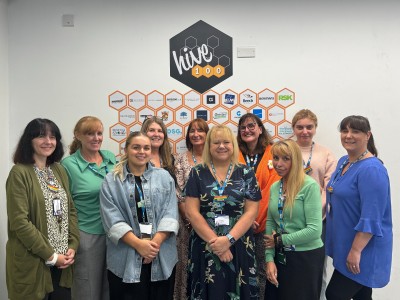
Contact: clare.
What we wanted to achieve
Waiting lists for Children and Young People Mental Health Services (CYPMHS) are growing nationally and worldwide. Consequently, there was a need to understand how referred children and young people on CWP’s waiting list could be better supported and assessed in a timely manner.
The CYPMHS Access Team have an open referral process for professionals, parents and self-referrals for young people aged 16 years plus, with easy access on the MyMind website. All referrals are triaged within 24 hours and any specialist referrals are sent across to core teams such as the Learning Disability team, Eating Disorder Team and 0-5 Team. The objectives were to:
- reduce waiting times, minimising delays by optimising resources and streamlining the referral pathway
- improve access to support to ensure children, young people and families receive timely mental health assessment of need
- improve relations with community agencies to ensure children and young people have access to the right service at the right time
What we did
The team recognised that they needed to solely focus on the waiting list. They paused all of their other duties to concentrate on the national four week wait list strategy. They reviewed admin processes to help to support staff and streamline the assessment pathway. The team focused on linking in with CWP’s third sector agencies to become more accessible, having the opportunity to work collaboratively to best support children, young people and families with moderate to severe mental health difficulties.
Results
Waiting times from referral to access to initial assessment have significantly improved in the last two years, with both average and longest waits to reduce by over 50%. Average wait in 2022 was 20 weeks, with 256 young people waiting, whilst average wait now is three weeks with an ongoing improving trajectory, and only just over 100 young people waiting. This has enabled the team to triage referrals with 24 hours, offer a comprehensive mental health assessment, with a safety plan and next steps for children, young people and families.
Next steps
Current modelling demonstrates that if referral rates remain static, there is capacity and resilience within the access team to sustain this trajectory for initial assessment and be compliant with the pending four-week national wait.
There is also scope to start developing the breadth of the role to include more systemic consultation and enhanced formulations.
Team: ADHD and Autism Team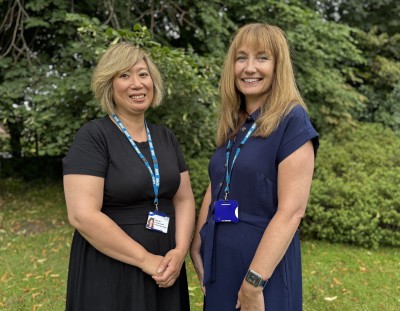
Contact: christine.
What we wanted to achieve
The ADHD Team were passionate to reduce ADHD pre-medication waiting times for young people, which was approximately 12 months. A large factor contributing to this increase in waiting time was the national ADHD medication shortage.
By designing and offering a pre-medication informative and interactive webinar for parents and carers, the team hoped to engage a larger audience, one session at a time. The team’s nurses were passionate to ensure the service continued to be person-centred and approachable to families, so created an interactive webinar to allow for questions and answers.
Additionally, this would free up further capacity amongst the nursing team for further monitoring appointments for young people.
What we did
Dr Christine Wee discussed the concept of the webinar during the team away day.
The ADHD specialist nurses, Gwen, Heather and Lisa brought this concept alive for families with commitment and dedication to develop and perfect the webinar.
The webinar was piloted in May 2024.
Results
Whilst the formal evaluation is not yet completed, this webinar, informative approach has demonstrated significant and impressive results to date. The pre-medication waiting times for young people has reduced from 12 months to two months.
The feedback from families is very positive. This inventive way of working would not have been so successful without the positive ‘outside of the box’ thinking and dedication from the team.
Next steps
The team plans to continue to work with participation and engagement colleagues to improve the patient journey for our families.
Team: Ancora House - Tier 4 CAMHS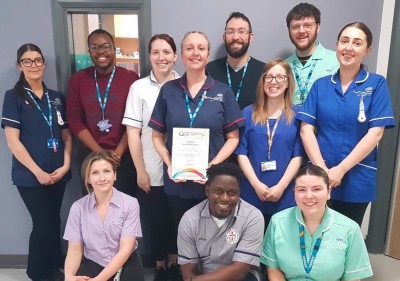
Contact: terri-anne.
What we wanted to achieve
Ancora House supports young people with mental health conditions, many of whom also have autism. Young people with autism often have additional support needs and find certain elements of the ward environment more challenging as a result.
The team originally explored the National Autistic Society’s (NAS) autism accreditation programme in 2020 following feedback from autistic young people and families, with an aim to improve the experiences of autistic young people at Ancora House. In 2021, Ancora was awarded the NAS Specialist Award for evidencing best practice in supporting autistic young people. Following this accreditation, the team has since been working towards achieving the Advanced Specialist Award – the highest level of NAS accreditation.
What we did
After achieving the NAS Specialist Award in 2021, the Ancora House team embarked upon the NAS Advanced accreditation programme in late 2023. The process took 12 months and concluded with a three-day assessment in December 2024. Some of the changes made during the process included:
- installing sound absorbers in the ceilings to reduce noise levels
- developing easy-read versions of patient literature
- making changes to furniture
- the introduction of a sensory room
- including autism awareness training in the local induction for new starters to ensure staff have a good understanding of autism
Results
During their inspection, the NAS assessed all aspects of patient experience for autistic young people, including speaking to young people and families for feedback. On 27 January 2025, Ancora House received official notification that it had achieved Advanced Specialist Award status. On their rationale for awarding the Advanced Accreditation, the NAS commented on the “standards of excellence” they observed in supporting autistic young people.
They commented that staff “have a comprehensive understanding of evidence-informed approaches associated with good autism practice” and “ensure support is person-centred and tailored to individual abilities, interests, preferences, and challenges.”
Through an anonymous survey, one parent commented: “Excellent team - they always put our child first and had an excellent way of making reasonable adjustments that worked for them.”
Next steps
As Ancora House has achieved the highest possible level of accreditation via the National Autistic Society (NAS), the focus will now be on maintaining the “standards of excellence” identified by the NAS. The team will also be sharing this example of best practice across the Trust, in the hopes that it inspires other CWP services to embark upon the NAS accreditation programme.
Team: Cheshire 0-18 Children and Young People's Mental Health Service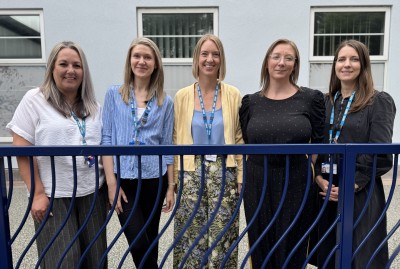
Contact: lauren.
What we wanted to achieve
Suicide is one of the leading causes of death among young people worldwide, with self-harm being the strongest predictor. Reducing the rates of self-harm and suicide amongst children and young people is a key driver within national policy, as well as being a strategic priority within the Children, Young People and Families (CYPF) Care Group. Complex Needs Escalation and Support Tool (CNEST) data showed that between 59-65% of children and young people in Cheshire 0-18 Children and Young People’s Mental Health Services (CYPMHS) presented with some level of risk of harm to themselves. Between 12% and 29% of these children and young people had attended A&E due to risk in the last month.
What we did
Dr Lauren Adderley, Dr Rachel Williams (both Principal Clinical Psychologists), and Dr Lesley Doyle (Consultant Clinical Psychologist), developed a strategic implementation plan to launch full-programme dialectical behaviour therapy for adolescents (DBT-A) across Cheshire 0-18 CYPMHS. NICE recommends DBT-A as the treatment of choice for children and young people with significant emotional dysregulation and frequent self-harm episodes. DBT-A prioritises self-harm and suicidal ideation as the primary targets for intensive therapeutic intervention, working with both the adolescent and their caregivers to provide weekly individual sessions, a weekly DBT skills group, telephone coaching and consultation.
Results
East and Central Cheshire 0-18 CYPMHS has launched active and comprehensive DBT-A programmes, providing gold standard care to adolescents most at risk of self-harm and suicide. Both programmes have had excellent uptake and retention, and are at capacity. Although in its infancy, qualitative data suggests that DBT-A has been well-received by adolescents and caregivers, with some already demonstrating more skilful behaviour in their everyday lives, including times of high distress. Quantitative outcome data measuring adolescents’ severity of symptomatology, ability to regulate their emotions, and health-related quality of life is being collected at multiple time points for analysis. Utilisation of crisis services is also being monitored.
Next steps
Seven additional clinicians will be trained in DBT in April 2025. This will allow for the expansion of DBT-A across Cheshire, therefore increasing the capacity for provision of DBT-A to a larger number of adolescents at risk of self-harm and suicide. DBT-A will be launched in West Cheshire 0-18 CYPMHS following this training. In addition to collecting qualitative and quantitative outcome data from adolescents and their caregivers, teams will be asked to provide feedback regarding their experience of the impact of DBT-A via surveys and/or focused discussion groups. This data will be shared at care group wide meetings.
Team: Family Nurse Partnership - 0-19 Starting Well Service
Contact: georgina.
What we wanted to achieve
The 0-19 Starting Well Service was aiming to extend the offer of the Family Nurse Partnership programme to care leavers age 24 and under (both mothers and fathers). This would support Cheshire West and Chester’s Corporate Parenting Strategy for 2023 to 2027 in acknowledging the unique challenges a care leaver faces due to their childhood experiences. The aim of the offer was to provide an evidence-based, intensive home visiting programme of tailored support to those young adults who have experienced being in care, during their transition into parenthood.
There was also an aspiration to develop and roll out a learning package for fathers to support and promote father-inclusive services.
What we did
The service established a working group which comprised professionals from CWP, Cheshire West and Chester Council and the 0-19 Clinical Programmes Unit. The group worked through the Early Intervention Foundation evaluation framework to establish a theory of change and logic model for the extended offer. They agreed on short, medium and long-term outcomes, what resources were needed, and devised an implementation plan to support its launch. They ensured tools were in place for robust data collection, providing an evidence base for the offer.
The service also developed an ‘Engaging Fathers’ learning package offer to both in-house and external professionals.
Results
- Funding was secured and a full time family nurse was recruited and in post February 2024 – commenced a 12-month Family Nurse Partnership learning programme.
- In February 2024, the extended service offer was launched.
- To date, the service has nine clients enrolled as part of the extended offer, with two of these being fathers.
- Data collection tools were identified and are now in use to evidence short, medium and long-term outcomes.
- Launched an ‘Engaging Fathers’ learning package via the Safeguarding Children Partnership website. Two sessions have been delivered to date, with 50 attendees. A further session was planned for March 2025 which was fully booked.
Next steps
- To continue to deliver the extended offer with continuous monitoring and review (plan, do, study, act).
- Robust data collection to provide an evidence base for the extended offer.
- To gain qualitative data through case studies of the fathers whom the service works with.
- Continue to attend the national Working with Fathers Community of Practice group to share best practice and ideas.
- To continue to roll out the ‘Engaging Fathers’ learning package to Starting Well and partner agencies, championing father inclusive services and practice.
Team: Wirral Children and Young People’s Mental Health Service Care Navigators
Contact: kelli.
What we wanted to achieve
Wirral Children and Young People’s Mental Health Service (CYPMHS) Care Navigators provide enhanced care navigation for children and young people who experience moderate to severe mental health difficulties.
This project aimed to increase access to community offers for all children and young people. It had three aims:
- Access to a home-based activity box for children isolated at home.
- Create an activity box offer for 14 to 18-year-olds.
- Increase access to live music.
The service wanted to facilitate access to types of activities promoted within an evidence-based resilience framework they use that that seeks to reignite interest, build on strengths, develop positive habits and spark a pathway into meaningful and inclusive community.
What we did
They held sessions with Unplugged CIC and the ‘Changemakers’ of Liverpool John Moores University to share the impact of current activity boxes and they secured business sponsorship.
Focus groups were completed with groups including Wirral SEND voice group, Comics Youth and Shaftesbury Youth Club. Ideas from dialectical behavioural therapy groups were taken to Comics Youth (where one of the young people attends), and the young people created the content.
Following the service’s conversations with young people in the service, they held meetings with Future Yard and secured inclusion into the Neighbourhood free ticket scheme.
Results
- Delivered 102 free boxes since summer 2024.
- Co-created a ‘Nordic Cosy Box’.
- Secured 200 free boxes and free tickets at unplugged community events for 2024/25.
- Secured 10 free tickets per live music event at Future Yard since May 2024.
Parent feedback includes:
“We were so pleased with the box and its contents. Thank you so much for this and the mindful time we’ve been able to spend together away from screens.”
“Layla enjoys that box that was dropped off about space. She recently borrowed some books from the library about space as wanted to learn more.”
Next steps
The service will facilitate a self-sign-up option without being in the service for future access to Future Yard.
Feedback which will be used to direct future development includes the following themes: famous singers; the NHS; life skills; democracy and human rights; mental health; coding; musical theatre; and specific links to Wirral.
With low level input, local community interest companies will bring to life the ideas of young people and drive projects to fruition with the support of local business. For the Nordic box that included a woodcutter from Wallasey, cardamom donations from a restaurant, a printing company and fundraising efforts from Liverpool students.
Team: Cheshire access services (Mental Health Support Teams and the Mental Health Hub)
Contact: jane.
What we wanted to achieve
The aim of the project was to provide an integrated parent support offer across the Cheshire access services - Mental Health Support Teams (MHSTs) and the Mental Health Hub. The objectives were to:
- better identify child mental health need and match services to need
- provide an accessible parent support offer within communities and reduce inequality of accessing this support
- provide timely interventions to support children, young people and families
What we did
- Provided parent-led, evidence-based programmes for parents to treat mild-to-moderate anxiety in children.
- Planned a rolling calendar of programmes across Cheshire East and Cheshire West, both face-to-face and online.
- Coordinated trained staff across our access services who could deliver these programmes throughout the year.
- Developed a referral pathway into this community offer via MHSTs and the Mental Health Hub.
- Developed a digital registration process.
- Developed a triage process to ensure the team was getting the right families into the right parent programme.
Results
Outputs have included:
- an evaluation framework has been established to capture impact using appropriate measurement tools
- a full calendar of parent-led programmes is now available across the whole of Cheshire, staffed by appropriately-trained and supervised access staff
- a clear referral pathway is now in place, which offers choice of options to access ‘registration’ sessions
Outcomes have included:
- Data from groups shows a statistically significant reduction in levels of child anxiety as measured by the Spence Child Anxiety Scale.
- Data also shows an increase in parents’ confidence in dealing with an anxious child and a decrease in parent strategies likely to maintain their child’s anxiety.
Next steps
- Consider Saturday morning registration sessions for parents to further improve access.
- Continue to monitor the impact of this work.
- Expand the online courses to improve access.
- Improving aggregation of data across the offer.
- Linking to the Key Stage 2 child screening process (identifying hidden need and matching to appropriate intervention).
- Increase the diversity of evidence-based programmes being offered to families.
- Continue to embed the co-design of the parent support offer.
- Train and support more staff to be part of the offer.
Team: 0-19 Starting Well Service
Contact: katie.
What we wanted to achieve
The Starting Well Service support those residing in Cheshire West and Chester to make informed and healthy choices for their families by delivering a wide range of activities. Their open access services provide accessible advice and support early in times of need to prevent escalation.
By protecting capacity and resources for prevention, we have been able to provide true early help through a whole-family approach.
The service’s aim was to prevent health and wellbeing needs occurring where possible, by supporting all families with bonding, feeding, routines, play, interaction, child development and more, as well as their own confidence and employment skills.
What we did
Starting Well delivers three care pathways under the Healthy Child Programme:
- Universal
- Targeted
- Specialist
Universal is the large majority and ‘early help’ services open to all can prevent need occurring or escalating.
Where resources are often targeted at those most in need (targeted / specialist), Starting Well balances this with services for the universal population to maintain their ability to manage and support their families as they grow.
Through open access services, they take a holistic and ‘think family’ approach to supporting children, tackling inequalities in health and education in a timely manner. Services are delivered by a team with specialist expertise and a varied skill mix.
Results
In 2024 (in addition to phone calls and texts messages for advice and support) families with a child under five years:
- visited 5,050 times in open access services (25% resided in the most deprived areas)
- visited 5,949 times in ‘Let’s Play’ (47% resided in the most deprived areas)
- ‘Let’s Play’ identified 130 families requiring onward support. Of the 130 families who went onto have further support through other services provided by Starting Well, 100% of families increased their confidence in parenting following the support
- visited 1,368 times in the breastfeeding support group (14% resided in the most deprived areas)
Next steps
- Continue improving family life with open access.
- 2025/26 baby massage and nurture parenting groups will become universal offers.
- Baby group drop-ins before ‘Let’s Play’ to support non-mobile babies to explore tummy time.
- Start collecting data for referrals or follow up required from attending open advice clinic.
- Employment support will be dropping into the ‘Lets Play’ sessions to meet families and start conversations about employment aspirations.
- Use Ages and Stages Questionnaire data to inform planning and displays so those who drop in to centres have targeted school readiness information based on known population needs.
Team: Wirral 0-18 Children and Young People’s Mental Health Service
Contact: kimberley.
What we wanted to achieve
A group for parents and carers of children age 0-10, developing mentalisation and using an attachment and relational lens. With an increase in referrals for this age range and a gap in the service offer specifically around trauma and attachment for this age, this group targets vulnerable families with intergenerational trauma and social care involvement.
The children are at risk of future difficulties. Intervening early and taking a whole system approach can reduce difficulties later in life and improve outcomes for children, their families, communities and society, as well as being cost effective in the future.
What we did
- The team reviewed the need for an intervention targeting our most vulnerable and at-risk families for the 0-10 age range.
- Two members of staff were trained in the Lighthouse Mentalisation Based Parenting approach.
- The team set up a referral process specific for the group offer and assessed families.
- They discussed the location for the group with local stakeholders, including families and agreed to facilitate it from a local children’s centre in the community.
- Lighthouse is a two-hour group over 22 weeks, therefore a big commitment for all involved.
- The team agreed regular supervision with the developer of Lighthouse, Gerry Byrne.
Results
Quotes from parents and carers who have attended Lighthouse have included:
- “Lighthouse has helped grow my confidence. I’m finding parenting easier each week and I’ve been able to develop friendships. It’s a safe space - I can open up and not be judged.”
- “This group is my safe harbour.”
- “Lighthouse has helped me to understand my grandson.”
- “It’s more important to be in a place of comfort and connection for my children rather than always needing to have the answers.”
Next steps
The next steps will be to:
- publish the process and findings from the group
- train more members of staff in this approach and offer more groups in the future
- liaise with other children and young people’s mental health services within CWP and hopefully replicate to ensure this is a wider offer
Team: Learning Disability Child and Adolescent Mental Health Service
Contact: lyndsey.
What we wanted to achieve
The Learning Disability Child and Adolescent Mental Health Service (CAMHS) team has a criteria of working with children and young people who have a severe or profound learning disability. The team were unable to offer a service to all the children within local specialist schools.
Children and young people with learning disabilities are far more likely to experience inequalities in their healthcare than those without a learning disability. They are also more likely to have worse mental and physical health. The service needed to expand their offer, so they changed their approach to a whole-school approach, meaning they are now inclusive of all the young people within these specialist schools.
What we did
The team co-ordinator and community nurses within the team met with the headteachers from the specialist schools to discuss what they could offer and how they could help to overcome any health inequalities. It was agreed that the team could offer one-off advice sessions and courses for parents, and group work for pupils.
With the agreed offer, the team then attended parents’ evenings where they could discuss what they were offering face-to-face with parents. The team also provided flyers that promoted and advertised the service. The flyers are shared on the schools’ social media accounts.
Results
The service now holds parent advice sessions and groups within specialist schools. They have had positive feedback from both schools and parents. They run a rolling programme of what groups are offered throughout the year.
“The addition of Learning Disability CAMHS attending the parents evening was useful for some parents. Most of the groups offered are well-attended, in particular the advice sessions.”
Park Lane School, Macclesfield
“I would just like to say a huge thank you to you for attending parents evening. I have received some really lovely comments from parents about you and how we all work together in the best interests of their child.”
Park Lane School, Macclesfield
Next steps
As this is a new approach, the team is continuing with their current offer. However, they plan to attend more parents’ evenings and improve on how they communicate this approach with parents, so they are fully aware of the Learning Disability CAMHS service.
Team: Starting Well 0-19 Service
Contact: clare.hitchen1@nhs.net
What we wanted to achieve
The Starting Well Service embarked on a quality improvement project in 2023 to increase the initiation and continuation of breastfeeding at six to eight weeks post-delivery.
The World Health Organisation recommends that infants should be exclusively breastfed for the first six months of life to achieve optimal growth, development and health, which in turn reduces health inequalities.
The service engaged with The United Nations International Children’s Emergency Fund (UNICEF) Baby Friendly Initiative (BFI) accreditation Stage 3 assessment to support their quality improvement initiative. The service’s breastfeeding rates at six to eight weeks (2023) were 46% - 4% below the England average of 50%.
What we did
All staff within the service undertook a comprehensive training programme in line with UNICEF BFI Standards (according to role), ensuring that the service’s messaging was evidence-based and high-quality.
The service was supported by Children, Young People and Families Care Group to commission Koala Northwest, a third sector organisation that has experience of delivering infant feeding support and antenatal education using a robust volunteering pathway.
The UNICEF BFI Stage 3 assessment is underpinned by a thorough audit schedule which the service used to benchmark standards of care, resulting in the development of an improvement plan focused on the needs of the local population.
Results
The service’s infant breastfeeding rate at six to eight weeks increased by 4% in 12 months of the improvement plan, and now meets the England average. The Stage 3 BFI assessment undertaken by UNICEF in January 2025 told them that:
- 100% of mothers interviewed by UNICEF said they were very happy with the care provided by the service
- 100% of mothers confirmed that they had the opportunity to discuss issues affecting ongoing breastfeeding
- it was clear to the assessment team that in many areas pregnant women and new mothers received a high standard of care
Next steps
The BFI assessment noted significant improvements in antenatal care and education. Ensuring the service’s offer reaches all expectant parents is a priority this year and they are engaging midwifery services to support this.
The service’s ambition is to exceed the England average for prevalence of breastfeeding at six to eight weeks through their continued partnership work in 2025/26. This means more children will achieve their optimal growth, development and health.
The service would also like to offer feeding advice and support to CWP staff who may be thinking about their return to work after having a baby, to make sure individual needs are accommodated.
Honorable mentions
With nearly 100 entries received for the Big Book of Best Practice 2024-25, we have unfortunately been unable to include every entry in the final book. However, many of the projects – despite not being selected for full publication – deserve to be celebrated for the fantastic outcomes achieved.
You can view the honorable mentions for the children, young people and families care group below:
- Our Voice Matters – series of coproduced participation and engagement videos - Children, Young People and Families Care Group / Learning Disabilities, Neurodevelopmental and Acquired Brain Injury Care Group
- Introduction of psychodynamic reflective practice to Wirral Children and Young Person’s Mental Health Service (CYPMHS) Intensive Support Function (ISF) - Wirral 0-18 Children and Young People's Mental Health Service (CYPMHS)
- Complex Needs Escalation and Support Tool (CNEST): Children’s Social Care Training - Complex Needs Escalation and Support Tool (CNEST) Team
- Development and mobilisation of continuous improvement huddles and improvement boards within the 0-19 Starting Well Service - 0-19 Starting Well Service
- Mental health assessment and support for the new CYP gender services - 0-18 Children and Young People's Mental Health Service Wirral
